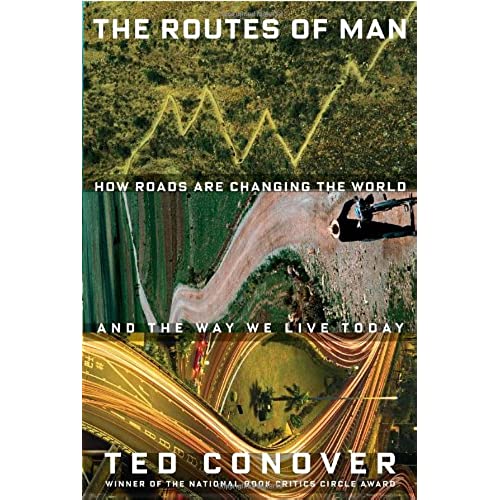

The Routes of Man: How Roads Are Changing the World and the Way We Live Today
-

Jane Collins
> 3 dayI thoroughly enjoyed it; its well written and written like a George Orwell essay; clear as a window pane, letting the people speak without much authorial input; delightful. Ends up being very informative about China drivers, African truck drivers, Palestinian & Israeli army road issues etc.
-

Breck
> 3 dayRealistic, objective descriptions of parts of the world I will most likely never get to see first hand.
-

Ernest Stalzo
> 3 dayThe subject is huge (roads, the biggest thing people have built) but the approach is specific, even intimate: Conover gets at the big story by telling smaller stories, and puts you right there-in the Hyundai, in the Humvee, in the Himalayan winter. Its an adventure story but its not macho, its human.
-

C. P. Anderson
> 3 dayQuick warning ... This is not the wide-ranging study youd think it would be from the title. Instead, its really just a series of vignettes set on the road somewhere throughout the world - a driving club in China, a truck route in East Africa, hiking a frozen river in Tibet, following the trail of mahogany from the jungles of Peru, riding along with an ambulance through the traffic jam that is Lagos, Israeli blockades in Palestine ... Now, these vignettes are mostly great. Conover is quite a gifted writer. He really gives you a feel for the places and people involved, and he does so without his own personality ever really intruding. (Some were better than others, though, with the Peru and Lagos ones seeming a little meandering.) That this book is presented as anything more than a random collection of tales, though, is a joke. Conover makes an effort, but its simply not there. I found his little intermezzos between stories especially annoying in this regard. Instead of relating another story, theyre mostly random musings and gatherings on some vague topic. One, called Double-Edged Swords, manages to discuss Napoleon, Baron Haussmann, the Trail of Tears, Bataan, J.M Coetzee, Dino Buzzati, Afghanistan, Eisenhower, Mad Max, and Cormac McCarthy all in the space of 5 pages. His métier is really just retelling his very interesting experiences. Along these lines, I highly recommed
-

James Denny
> 3 dayTed Conovers The Routes of Man, is a first-person narrative of six separate road journeys. Three of the road tales take place in Asia, two in Africa and one in South America. Conover deftly separates each of his road tales with a bridge chapter, a short chapter focusing on the history of roads. One such example is a history of the extension of political and military power, cultural influence and the technological innovations of Roman Roads. His first journey begins in Peru where he seeks to find answers to the logging of mahogany in the Amazonian part of Peru where virgin mahogany trees still grow and are logged--legally and illegally. His second journey is to the high mountains of northern Kashmir, a border region where India, Pakistan and China come together. This is a cold, alpine clime; the road journey is actually a hike through a high mountain pass. Beware travelers, a modern road is coming soon and with it, will come the loss of local culture, history and tradition. There is sadness as the loss of local culture and history is imminent. His journey to East Africa is along a trucker road across Kenya into Uganda. He teams up with a trucker on a route that has become notorious in the spread of AIDS. His quest to find answers to the spread of AIDS is the quixotic Holy Grail of this journey. Conovers journey into the occupied West Bank and into Israel proper is tragic for what Israel has succeeded in doing: isolating and de-humanizing Palestinian people in their own land. A road system along with a so-called security fence has effectively produced an apartheid in which the Palestinian people cannot easily tend to their sheep and goats, prune their olive trees, visit with friends and relatives or simply get to work. For Palestinians, this cleverly designed road system has truly segregated an entire people. Conover evenhandedly narrates the difficult situation Israeli soldiers face at what are called checkpoints, a mix of permanent, semi-permanent or temporary military garrisons along the roads where Palestinans who need to travel face searches, long-lines and dehumanizing treatment. In China, Conover narrates a journey along a network of rapidly developing highways that within the next quarter-century are likely be overwhelmed with automobiles. Government policy has stated a goal to unite the nation to bring the outer parts of China (Tibet and Xinjiang) into the modern Chinese state. Modern high-speed highways will undoubtedly accelerate the Sinification of the country by the dominant Han Chinese. In this journey, Conover hooks up with nouveau riche Chinese members of a Beijing-based auto club who take a club-led road trip into the interior of China and visit among other sites, the nearly-complete Three Gorges Dam. Conovers last journey is to Lagos in Nigeria. No need to say more than this would not be a destination for people who fancy a driving vacation holiday. Good read! Five stars.
-

LINDSEY
> 3 dayok
-

jasmine
Greater than one weekThere is no cover page or table of contents in the kindle version (there are both of these in the hard copy) so I cant easily move back to the notes or bibliography while Im reading. The maps are nearly illegible except when I get out a magnifying glass. this book needs to be read in hard copy.

